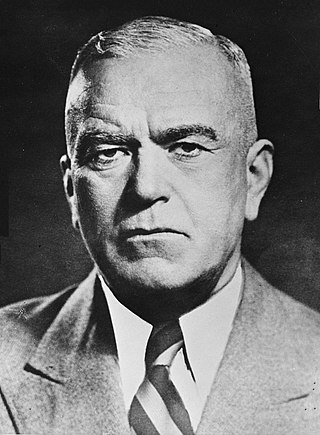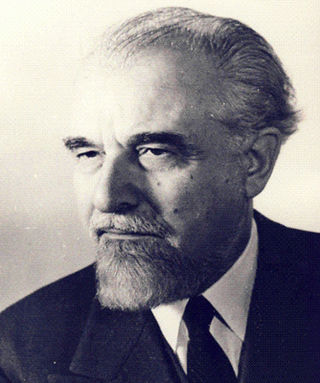| |||||
| Decades: | |||||
|---|---|---|---|---|---|
| See also: | |||||

Events from the year 1945 in Romania. The year saw the end of Romania's involvement in World War II and the foundation of the pro-Communist government of Petru Groza.
| |||||
| Decades: | |||||
|---|---|---|---|---|---|
| See also: | |||||

Events from the year 1945 in Romania. The year saw the end of Romania's involvement in World War II and the foundation of the pro-Communist government of Petru Groza.

Petru Groza was a Romanian politician, best known as the first Prime Minister of the Communist Party-dominated government under Soviet occupation during the early stages of the Communist regime in Romania, and later as the President of the Presidium of the Great National Assembly from 1952 until his death in 1958.

Nicolae Rădescu was a Romanian army officer and political figure. He was the last pre-communist rule Prime Minister of Romania, serving from 7 December 1944 to 1 March 1945.

The Romanian Communist Party was a communist party in Romania. The successor to the pro-Bolshevik wing of the Socialist Party of Romania, it gave an ideological endorsement to a communist revolution that would replace the social system of the Kingdom of Romania. After being outlawed in 1924, the PCR remained a minor and illegal grouping for much of the interwar period and submitted to direct Comintern control. During the 1920s and the 1930s, most of its activists were imprisoned or took refuge in the Soviet Union, which led to the creation of competing factions that sometimes came into open conflict. That did not prevent the party from participating in the political life of the country through various front organizations, most notably the Peasant Workers' Bloc. During the mid-1930s, due to the purges against the Iron Guard, the party was on the road to achieving power, but the dictatorship of king Carol II crushed this. In 1934–1936, PCR reformed itself in the mainland of Romania properly, with foreign observers predicting a possible communist takeover in Romania. The party emerged as a powerful actor on the Romanian political scene in August 1944, when it became involved in the royal coup that toppled the pro-Nazi government of Ion Antonescu. With support from Soviet occupational forces, the PCR pressured King Michael I into abdicating, and it established the Romanian People's Republic in December 1947.

Ștefan Voitec was a Romanian Marxist journalist and politician who held important positions in the state apparatus of Communist Romania. Debuting as a member of the Socialist Party of Romania in his late teens, he formed the Socialist Workers Party of Romania, then the United Socialist Party, while also engaging in human rights activism and advocating prison reform. The mid-1930s brought him into contact with the Romanian Communist Party, with whom he formed tactical alliances; however, he rejected its political line, and was for a while known as a Trotskyist. In 1939, he joined the consolidated Social Democratic Party, which reunited various socialist groups outlawed by the National Renaissance Front. During World War II, despite ostensibly withdrawing form political life to do research, Voitec served as the party's Secretary and joined the anti-fascist underground. Some reports suggest that he was also a committed anti-communist, critical of the Soviet Union to the point on endorsing war in the East. As a war correspondent, Voitec made contributions to Nazi propaganda, an issue which made him vulnerable to blackmail in later decades.

The Ploughmen's Front was a Romanian left-wing agrarian-inspired political organisation of ploughmen, founded at Deva in 1933 and led by Petru Groza. At its peak in 1946, the Front had over 1 million members.

Miron Constantinescu was a Romanian communist politician, a leading member of the Romanian Communist Party, as well as a Marxist sociologist, historian, academic, and journalist. Initially close to Communist Romania's leader Gheorghe Gheorghiu-Dej, he became increasingly critical of the latter's Stalinist policies during the 1950s, and was sidelined together with Iosif Chișinevschi. Reinstated under Nicolae Ceauşescu, he became a member of the Romanian Academy.

General elections were held in Romania on 19 November 1946, in the aftermath of World War II. The official results gave a victory to the Romanian Communist Party (PCR), its allies inside the Bloc of Democratic Parties, together with its associates, the Hungarian People's Union and the Democratic Peasants' Party–Lupu. The event marked a decisive step towards the disestablishment of the Romanian monarchy and the proclamation of a Communist regime at the end of the following year. Breaking with the traditional universal male suffrage confirmed by the 1923 Constitution, it was the first national election to feature women's suffrage, and the first to allow active public officials and army personnel the right to vote. The BPD, representing the incumbent leftist government formed around Prime Minister Petru Groza, was an electoral alliance comprising the PCR, the Social Democratic Party (PSD), the Ploughmen's Front, the National Liberal Party–Tătărescu (PNL–Tătărescu), the National Peasants' Party–Alexandrescu (PNȚ–Alexandrescu) and the National Popular Party.

Gheorghe Avramescu was a Romanian Lieutenant General during World War II. In 1945, he was arrested by the NKVD on the Slovakian front and died in custody the next day.
The Socialist Peasants' Party was a short-lived political party in Romania, presided over by the academic Mihai Ralea. Created nominally in 1938 but dissolved soon after, it reemerged during World War II. A clandestine group, it opposed the fascist regime of Ion Antonescu, although its own roots were planted in authoritarian politics. Looking to the Soviet Union for inspiration, the PSȚ was cultivated by the Romanian Communist Party (PCdR), and comprised a faction of radicalized social democrats, under Lothar Rădăceanu.

The National Popular Party was an antifascist political party in Romania, founded during World War II as the underground Union of Patriots. The latter had defined itself as a spontaneous movement of resistance to the dictatorial regime of Ion Antonescu, but was largely known as a front for the illegal Romanian Communist Party. Its founders—Dumitru Bagdasar, Gheorghe Vlădescu-Răcoasa, Simion Stoilow—were closely cooperating with PCdR men, but also with liberal opposition forces. Repressed by the authorities, the UP made a comeback after the pro-Allied August 23 Coup of 1944, when it endured as a small ally of the communists—mostly controlled directly by them, but sometimes rebellious.
The following lists events in the year 2016 in Romania.

The cabinet of Nicolae Rădescu was the government of Romania from 6 December 1944 to 28 February 1945. It was the last non-Communist government of Romania until the Romanian Revolution.
Events from the year 1948 in Romania. The year saw the formalisation of the Romanian People's Republic.
Events from the year 1949 in Romania. The year saw the introduction of collectivization and the first Romanian identity card.

Events from the year 1950 in Romania. The year saw Romania build relationships with other Communist states, including China and East Germany.

Events from the year 1951 in Romania. The year saw the Bărăgan deportations.
Events from the year 1953 in Romania. The year saw the death of Carol II.
Events from the year 1958 in Romania. The year saw the end of the Soviet occupation of Romania with the last Soviet troops leaving the country.